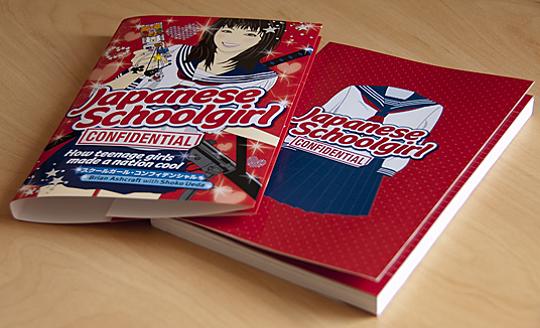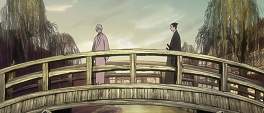Posts with the “japanese” tag
Why Eden of the East isn't for you - Part 1
It was spring 2009. Code Geass had been over for many months and nothing had filled that void: a show which unified otherwise disparate fans. Production I.G. had long since wrapped up the Ghost in the Shell: Standalone Complex project, following them up with two other Masamune works of varying popularity and polish - Ghost Hound and Real Dive. Kenji Kamiyama meanwhile had completed the respectable Serei no Moribito and was then attached to a new project. Could this be? All the signs pointed to another A-grade production, so was Eden of the East The Next Big Thing?
Japanese Schoolgirl Confidential
Coming from the husband and wife team that includes Brian Ashcraft of Kotaku and WIRED fame, Japanese Schoolgirl Confidential charts the rise of schoolgirls in Japan from background to brand, exploring the details and influences that surround them. Printed in a stubby, easily held format, the book is littered with photographs and illustrations that support the content, but is also adorned with a variety of kitschy, gaudy paraphernalia like faux-diamond bordered hearts as image captions and heart stickers in the corners. The format is fitting for the subject matter, keying into the peppy and sparkly façade, but completely at odds with the variety and veracity of content that the book offers from start to finish. The level of research, care and attention that has been put in is gratifying for a book that could easily have been as vapid and frivolous as one assumes the eponymous schoolgirls are.
The greratest triumph of the book is in debunking that mentality: that the schoolgirls, decked out in iconic sailor-suit school uniforms, are a product carried by a society that has a borderline hysterical lust for cute characters and intense consumerism. Subverting that impression to show the girls as drivers behind many of the sea-changes that happened in fashion and product development to moulding gender issues is cleverly done and achieved through example more than a stolid recounting of facts. The book is divided into eight chapters that begin by covering the history of the most obvious trait - the uniform - then moving on to idols, film, magazines, art and wrapping up with video games, manga and anime.
Dogs and Demons: The Fall of Modern Japan
Alex Kerr is no stranger to Japan, his books and history demonstrate a continuing personal involvement and deep affection for the country which is hard to find in many foreigners. Perhaps best know for the seminal Lost Japan, Dogs and Demons: The Fall of Modern Japan was published eight years later in 2002 and aims to get to the heart of how Japan as a nation has been degrading since the Second World War and before. At times it is a bleak and unforgiving book that aims with ruthless precision to uncover why Japan, once sequestered, then exposed, then devastated, then superior and now, supposedly irrelevant, has become that way. By and large it succeeds and prises open a world that no other book has had the courage to touch upon - indeed Kerr expands on this at many points throughout the ~400 page book. Unfortunately though it is hamstrung by many arguments which boil down to personal opinion and though convincing, it is difficult not to see this as only one side to a very complex and pertinent argument.
3 Episode Taste Test: Saraiya Goyou (House of Five Leaves)
Not to be confused with the horror novel, House of Leaves, House of Five Leaves sports a visually distinctive aesthetic that mixes painterly backgrounds with spindly, dark eyed characters. More effective in motion than in stills, the opening trio of episodes are methodically paced, carefully balancing the meandering story with character development - a cast of rogues that revels in the offbeat and avoids archetypes. Dealing with a variety of social and moral grey areas, the question of who the real villains are underpins a lot of narrative but it is the well crafted protagonist which keeps this series fresh and engaging.
Masanosuke Akitsu is a ronin down on his luck - unable to hold a steady job due to his perceived unreliability yet too proud to take on manual labour. His luck changes however when by chance he meets Yaichi, a mysterious and carefree man coincidentally on the lookout for a softly spoken but capable samurai to become his bodyguard. Masa's first encounter on the job however reveals an unsavoury side to Yaichi who it transpires is the head of the Five Leaves, a group which kidnaps members of rich families and demands a ransom for their return. Masa is conflicted about this turn of events and although Yaichi has a strange fascination towards him, he cannot in good conscience continue to work for them, even if they do feed him and he keeps company with their members. His unwitting hand in the kidnap of a young boy however may be enough to divorce him from the group for good.







